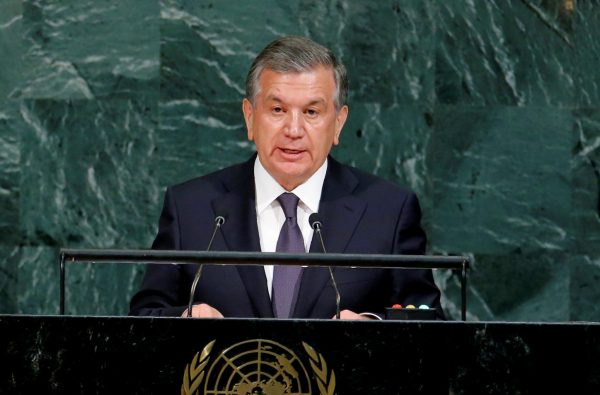Uzbekistan was the region’s key trendsetter this year. Its new president, Shavkat Mirziyoyev, consolidated his rule and proceeded with a program of reforms designed to liberalise the socio-economic landscape of Central Asia’s most populous country. Whether these reforms will lead to greater political freedom or merely upgrade Uzbekistan’s authoritarian regime remains unclear.
Mirziyoyev’s foreign policy broke the mould of self-isolation, suspicion and acrimony that characterised Tashkent’s relations with regional capitals under his long-serving predecessor Islam Karimov. Mirziyoyev likened the process of normalising regional ties to melting 20-year-old ice. Two years ago, nobody could have predicted a rapid and comprehensive diplomatic thaw between Uzbekistan and Tajikistan, which had been locked in a virtual cold war.
Yet the atmosphere of confrontation evaporated this year. Trade and official exchanges flourished. The language of strategic cooperation, friendship and brotherhood filled the air. After decades of inaction, the intractable process of border demarcation between Kyrgyzstan, Tajikistan and Uzbekistan began to gain momentum, and Kazakhstan announced that it had resolved all border issues with its neighbours.
Improved bilateral relations paved the way for regional multilateral engagement. In March 2018, an informal summit of five Central Asian nations took place in Astana after a 15-year hiatus. While it would be premature to suggest that institutionalised cooperation is now firmly in the making, Kazakhstan’s President Nursultan Nazarbaev described the meeting as a sign that Central Asian states can deal with intraregional issues collectively and independently of third parties. The summit is set to become an annual event.
Kazakhstan and Uzbekistan excelled at international relations this year, each maintaining a careful balance between Russia, China and the West. Kazakhstan, which held a non-permanent seat in the United Nations Security Council in 2017–18, pushed for the harmonisation of great power efforts on issues such as nuclear non-proliferation, strategic stability, and conflict resolution in Asia and Africa.
Elsewhere, Astana granted the United States access to Kazakhstan’s ports to supply troops in Afghanistan. At the same time, it cooperated with Moscow by signing the convention on the Caspian Sea’s legal status, which excludes the possibility of further US military presence in the region.
Uzbekistan’s Mirziyoyev went on a charm offensive and secured billions of dollars in investment from Beijing, Moscow and Washington without taking on any onerous geopolitical obligations. Tashkent also hosted a successful international conference on Afghanistan, positioning itself as an honest broker in securing Afghan peace.
China’s Belt and Road Initiative (BRI) made steady progress in Central Asia with dozens of new transport and infrastructure projects initiated in Kazakhstan, Kyrgyzstan, Tajikistan and Uzbekistan. Contrary to predictions of increased China–Russia rivalry in the region, relations between Beijing and Moscow actually improved. Through the BRI and the Russian-led Eurasian Economic Union (of which Kazakhstan and Kyrgyzstan are members), the two countries are edging closer to a framework agreement on trade and investment. A considerable convergence of interests among China, Russia and the Central Asian republics was on display at the Tsingtao summit of the Shanghai Cooperation Organisation in June 2018.
The Uzbek thaw, increased flow of investment spearheaded by the BRI and Russia’s modest economic recovery contributed to Central Asian countries’ solid economic performance. Their combined economic growth rate for 2018 is expected to reach 4.6 per cent. The upward trend is set to continue in the medium term, averaging 4.1 per cent per annum.
Turkmenistan was an outlier, experiencing a financial crisis caused by the collapse in gas prices. Reports of spontaneous protests against rising prices, food shortages and unemployment trickled out of the closed country throughout the year. Russian monopoly Gazprom will resume purchasing Turkmen gas on 1 January 2019, possibly throwing a lifeline to the struggling government of President Gurbanguly Berdimuhamedov. Yet without structural economic reforms this may bring only a temporary respite.
Kyrgyzstan and Tajikistan also had to cope with internal instability in 2018. In Kyrgyzstan, a standoff between President Sooronbay Jeenbekov and his predecessor Almazbek Atambaev, who heads the pro-government faction in parliament, led to a full-blown political crisis. Jeenbekov’s call for intra-elite consolidation and national unity showed his concern about avoiding a repetition of the events in 2005 and 2010 when the government was changed through non-constitutional means.
Tajikistan experienced serious trouble in the Gorno-Badakhshan Autonomous Region, which has a lengthy tradition of defying central control. Tajik President Emomali Rahmon presided over a crackdown on local authorities who he accused of collusion with drug traffickers and other criminal networks. A deadly attack on foreign cyclists for which the so-called Islamic State claimed responsibility and skirmishes on the border with Afghanistan involving airstrikes highlighted the tense security situation in the country.
Some good news for Tajikistan was the completion of the first stage of the Roghun hydropower station. Rahmon had made the project a symbol of national revival and a personal moral quest. His legitimacy received a boost once the plant began to generate electricity.
A relaxation of long-standing regional tensions was the most noticeable process in Central Asia in 2018. If the trend continues, individual countries will be better positioned to muddle through domestic problems and deal with complex international relations and security issues next year and beyond.
Kirill Nourzhanov is Senior Lecturer in the Centre for Arab and Islamic Studies, The Australian National University.
This article is part of an EAF special feature series on 2018 in review and the year ahead.

